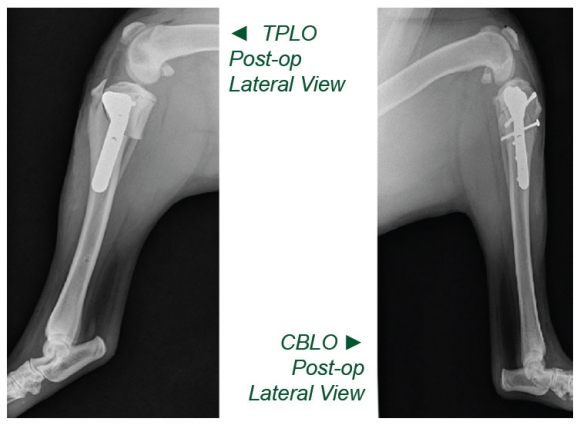


ASK US
TPLO vs. CBLO – Which one should my dog have? - Dr. Allen Dunbar
 For over 20 years the recommended standard of care was the TPLO procedure for active or larger breed patients with ACL injuries. The TPLO procedure consistently provided significantly better results versus other osteotomy based or extra-articular type procedures. Approximately 5 years ago, however, I pursued advanced training which has allowed me to offer a newer procedure, the CBLO. Both procedures correct the angle of the tibia which subsequently stabilizes the abnormal motion of knee found in ACL patients, but CBLO is different for several reasons.
For over 20 years the recommended standard of care was the TPLO procedure for active or larger breed patients with ACL injuries. The TPLO procedure consistently provided significantly better results versus other osteotomy based or extra-articular type procedures. Approximately 5 years ago, however, I pursued advanced training which has allowed me to offer a newer procedure, the CBLO. Both procedures correct the angle of the tibia which subsequently stabilizes the abnormal motion of knee found in ACL patients, but CBLO is different for several reasons.
CBLO stands for CORA Based Leveling Osteotomy. In this procedure the Center Of Rotational Angle is measured and used rather than the tibial plateau angle. Both procedures involve curved shaped cuts to the bone, but the CBLO is dome shaped rather than concave. This allows for a more natural alignment of the weight bearing forces through the limb. Once the CBLO cut is made and the rotation is performed, the site is compressed and secured with a “headless compression screw”. Additionally, the plate used contains locking screw technology which adds further stability to the construct. The updated hardware used also translates to faster healing times.
Not only does the CBLO shine for large breed ACL patients, the development of appropriate sized implants has moved the treatment of smaller breed ACL patients to a new level of care. Statistically, many small breed ACL patients have a higher CORA angle than larger patients. Extra-articular stabilization procedures have a much harder time restoring ideal positioning in these higher angled patients and therefore return to function is often impacted. The flexibility we have with CBLO implant sizes allows us to provide better care and benefit to our smaller patients as well.
Benefits to CBLO include:
- Compression of the osteotomy (cut) site which creates a more stable construct and thus improves early function and faster healing.
- Can be used in all sizes of patients.
- No “pivot shift” which is common to TPLO patients due to the improved alignment.
- No “balcony” effect common to TPLO patients which tends to create a secondary transplant of the weight bearing axis.
- Can be performed on younger patients because the osteotomy site is below the growth plates.
- Facilitates correction of patients with excessive tibial plateau angles.
- Can be used simultaneously with correction of patients with luxating patellas.
- Provides excellent passive as well as dynamic stability.
At Packerland we are always learning and always looking to provide the most up-to-date and best possible care to our patients.
If you are potentially interested in pursuing the CBLO procedure for your dog, please call our office and schedule your orthopedic consult with Dr. Dunbar.



